The GeForce GTX 1060 Founders Edition & ASUS Strix GTX 1060 Review
by Ryan Smith on August 5, 2016 2:00 PM ESTOverclocking
For our final evaluation of our GTX 1060 cards, let’s take a look at overclocking.
We’ll start things off with NVIDIA’s GeForce GTX 1060 Founders Edition. This card has a 3+1 power delivery system and a 116% TDP limit. Like the earlier GTX 1080 and 1070 cards, the GTX 1060FE can be “overvolted” to 1.093v to unlock an additional boost bin.
| GeForce GTX 1060FE Overclocking | ||||
| Stock | Overclocked | |||
| Core Clock | 1506MHz | 1706MHz | ||
| Boost Clock | 1709MHz | 1909MHz | ||
| Max Boost Clock | 1911MHz | 2100MHz | ||
| Memory Clock | 8Gbps | 9Gbps | ||
| Max Voltage | 1.062v | 1.093v | ||
We were able to overclock the GTX 1060FE’s GPU an additional 200MHz (12%), bringing the boost clock to 1909MHz. Unsurprisingly, this is very similar to the GTX 1080 and 1070, both of which overclocked by around 200MHz as well. Consequently it looks like both GP104 and GP106 seem to have similar voltage/frequency curves. Meanwhile we were able to push the memory another 1Gbps (13%) to 9Gbps.
Our other GTX 1060 is ASUS’s ROG Strix GTX 1060 OC. This card features a more advanced cooler and 6+1 power delivery system, but it also ships with a factory overclock. So all things held equal it’s likely that there’s not as much headroom for additional end-user overclocking. Meanwhile the card also ships with a built-in OC setting via ASUS’s GPU Tweak II software, which offers a small, virtually guaranteed overclock.
| ASUS Strix GTX 1060 OC Overclocking | |||||
| Stock | OC Mode | Overclocked | |||
| Core Clock | 1620MHz | 1646MHz | 1720MHz | ||
| Boost Clock | 1848MHz | 1874MHz | 1948MHz | ||
| Max Boost Clock | 2025MHz | 2050MHz | 2113MHz | ||
| Memory Clock | 8.2Gbps | 8.2Gbps | 9.2Gbps | ||
| Max Voltage | 1.062v | 1.062v | 1.093v | ||
As expected, due to its factory overclock the ASUS GTX 1060 doesn’t offer quite as much end-user overclocking. We were able to add another 100MHz (5%) to the GPU, half that of the stock clocked GTX 1060FE. Though it should be noted that in absolute terms the ASUS card has overclocked a bit farther than NVIDIA’s card, with a base clock 14MHz higher and a boost clock 39MHz higher. Meanwhile we got a slightly higher memory overclock out of the card as well, with the card topping out at 9.2Gbps, 1Gbps (12%) over the card’s shipping memory frequency.
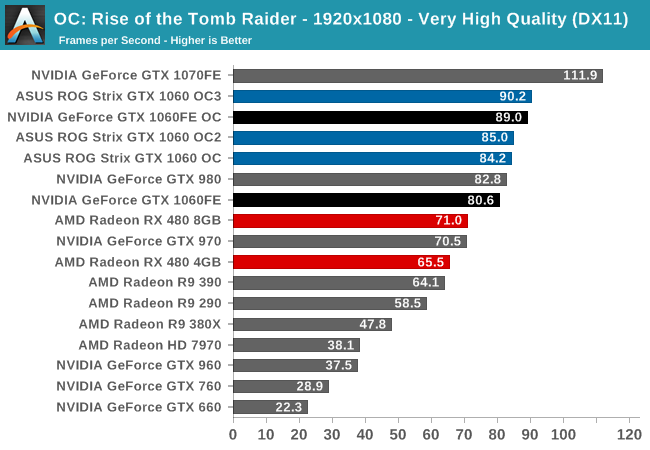
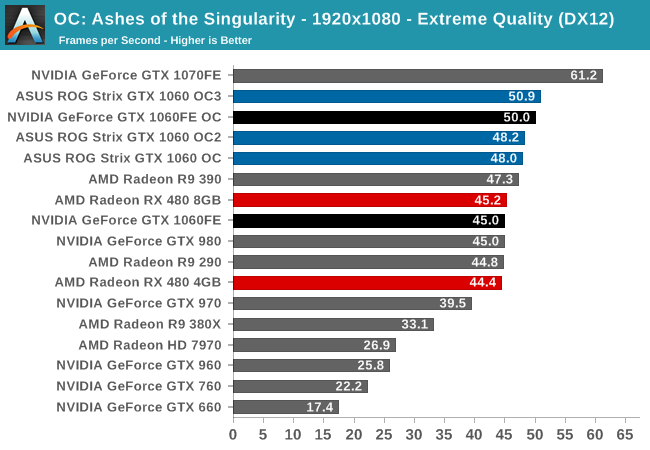
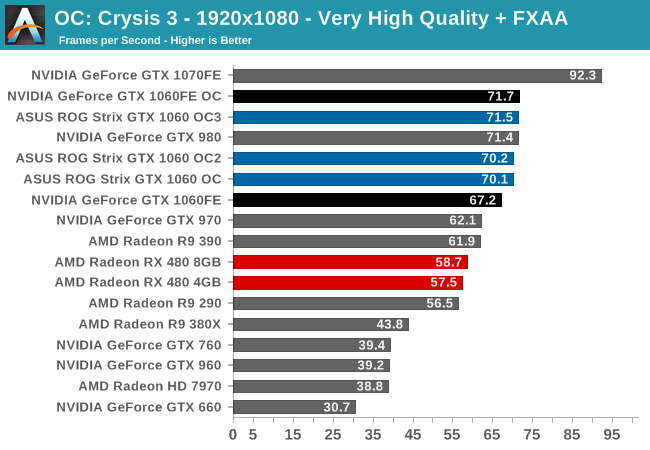
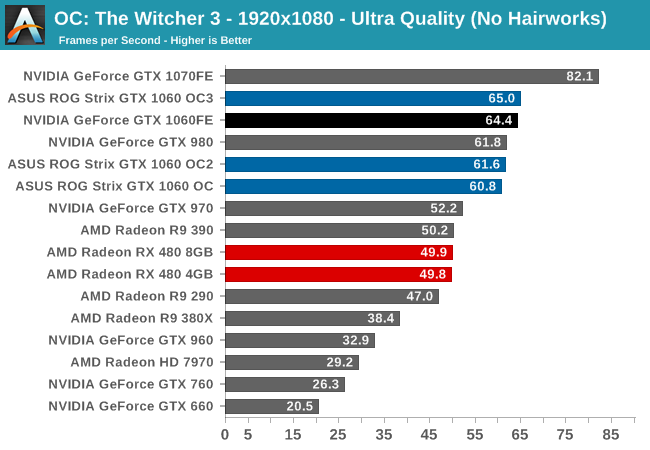
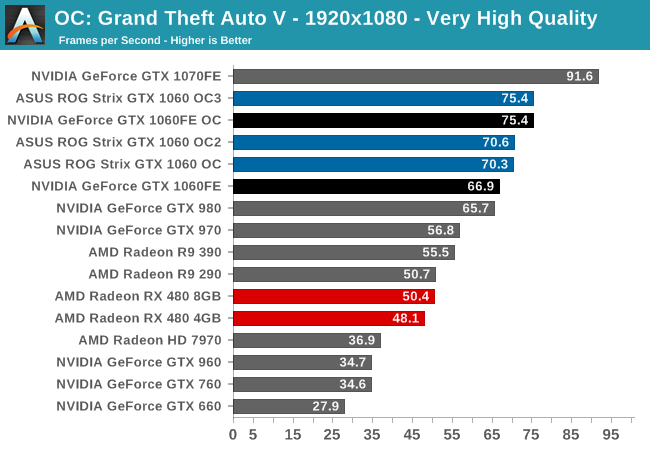
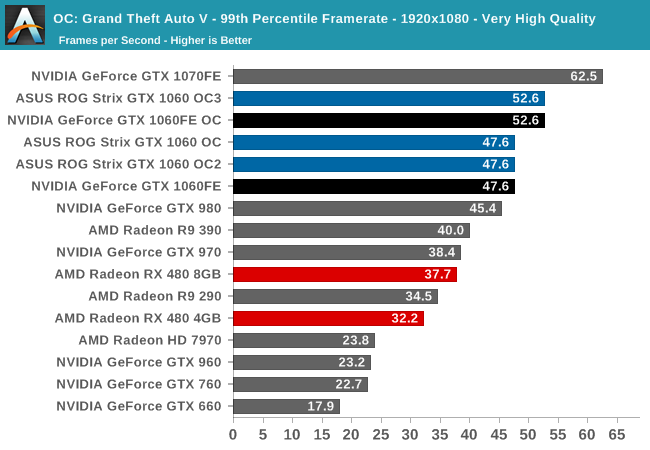
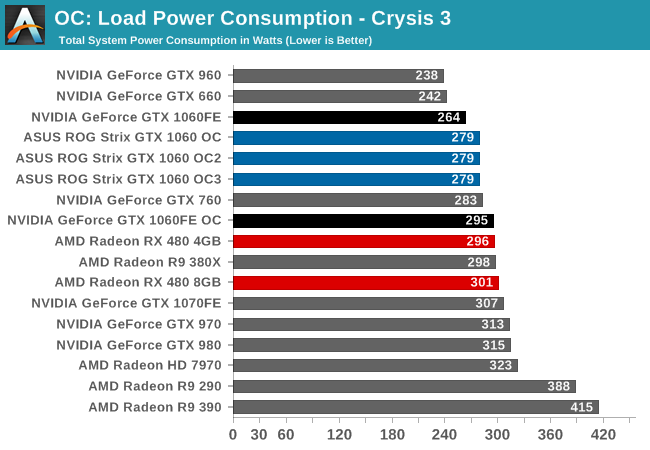
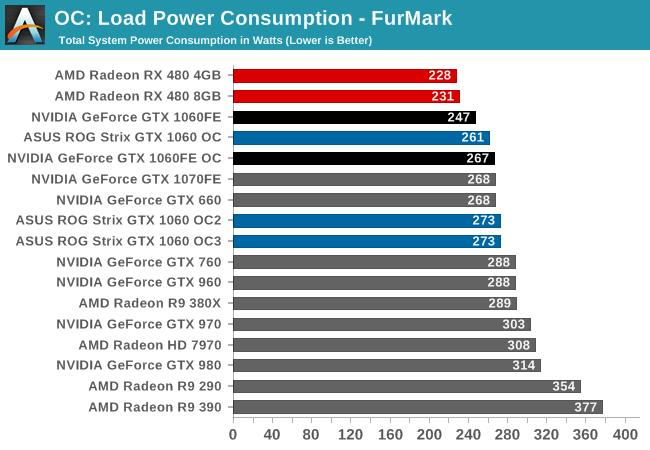
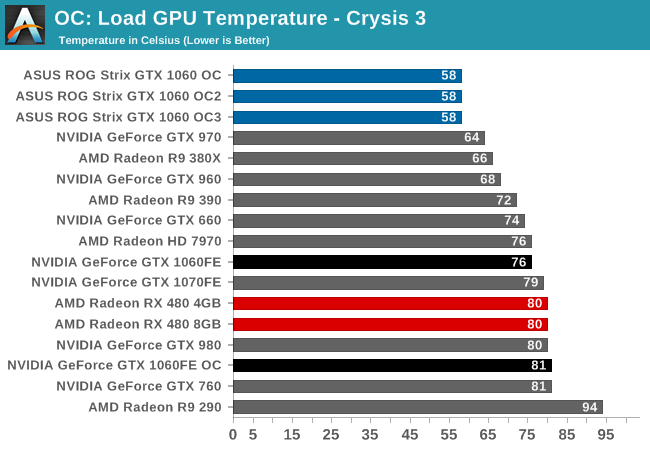
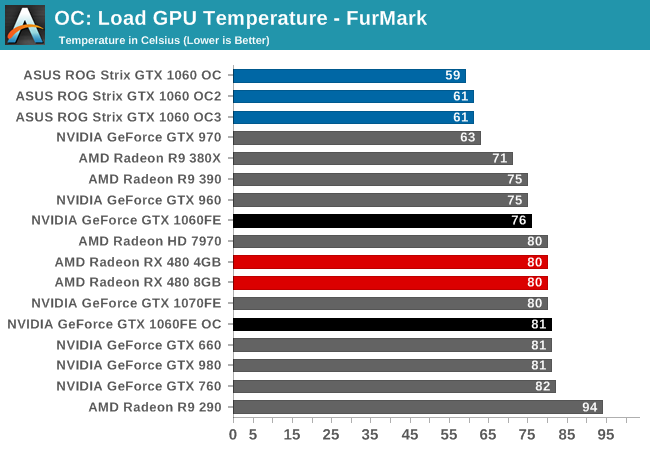
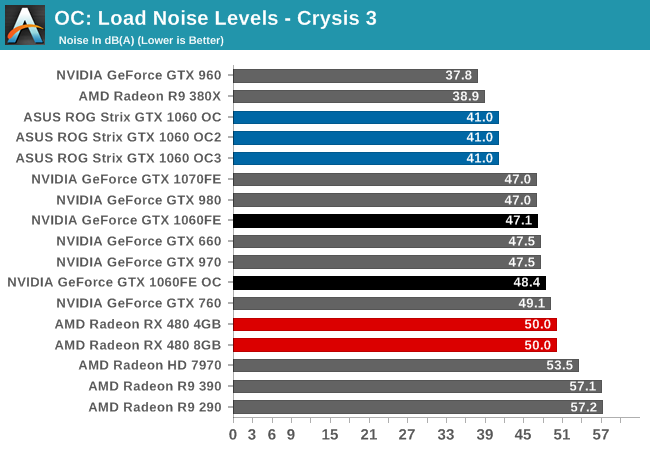
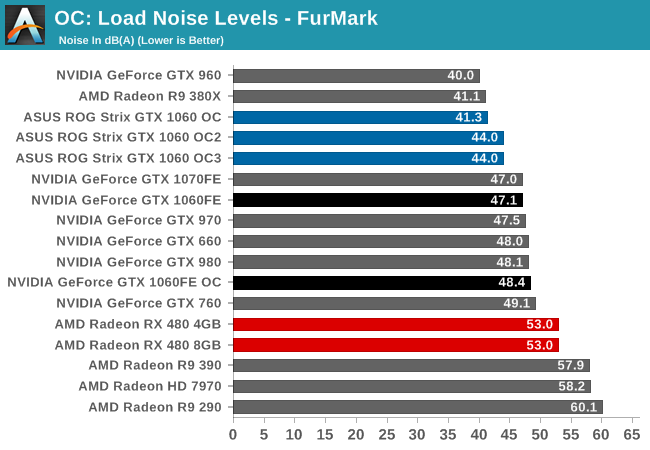
The overall performance gains and resulting power/temperate/noise costs are about as expected. The additional overclock helps the performance of the GTX 1060, but it’s nowhere near enough to close the gap with the GTX 1070. Meanwhile the final overclocks of the NVIDIA and ASUS cards are close enough that their peak performance is neck-and-neck.










189 Comments
View All Comments
Younanomous - Monday, August 8, 2016 - link
So would it be a good investment to go for the 1070 for 1080p if I plan t keep the card for 3+ years? I'm always told that the X70's are overill for 1080p.JamesAnthony - Monday, August 8, 2016 - link
Thanks for another Excellent review.The review shows the GTX 1060 is an excellent value/performance card.
While there is a bunch of arguing back and forth I think it's fairly clear to say that:
a. There is a huge installed base of people with monitors running 1920x1080
b. The GTX1060 offers excellent performance from a price / performance standpoint
c. For most intents and purposes the GTX 1060 and RX 480 8gb have similar performance under most applications and give or take a bit are similar in price & the prices will drift down a bit as supply finally fully catches up with demand. (I was able to land 2 of the Overclocked Zotac ones at $275 each on launch day).
d. If you have a lot of brand loyalty (in my case Nvidia drivers just work better for me), you'll pick based on your preference, and then people who truly don't care (I think there are less of those) can pick based on specific things they want, but neither is a bad choice unless you have to have FP64 then it's AMD only.
The RX 460 is going to be quite interesting from the extreme cheap budget / power capped viewpoint if it comes in around the $120 range & has a 75w power draw that doesn't need a power connector.
I'd love to see a GTX 1050 that was PCIe power only and could go standard single slot or low profile single / dual slot to compete. (with it being able to go single slot, low profile as the ultimate idea).
loop - Monday, August 8, 2016 - link
buy rx 480 or gtx 1060?elessar25 - Monday, August 8, 2016 - link
I read on Eurogamer that AMD's GPUs outperform NVIDIA on "close to metal" APIs like DX12. Although this review proofs without a doubt that the GTX 1060 is more powerful overall than the RX 480, I'm curious if this will hold true going forward? For someone who wants to future-proof their system, which is the better GPU? Disclaimer: I'm not a fanboy and I currently run a GTX 670.Greeba77 - Tuesday, August 9, 2016 - link
This is pretty much what I was getting at in my above comment, curious to know...Tech-Curious - Wednesday, August 10, 2016 - link
We don't know, but it seems reasonable to guess, based on recent history, that:1.) AMD's relative performance will likely increase, whereas nVidia's will probably decrease with time, as a result of driver optimizations for the former and the lack thereof for the latter. Keep in mind that this isn't necessarily an indictment of nVidia or a compliment to AMD; it could be interpreted as nVidia's optimizing their drivers better at the outset, leaving them less headroom to improve. But for whatever reason, past-gen nVidia cards seem to fall back relative to their competition later on.
2.) AMD will tend to gain more from DX 12. Whether "gaining more" means that any particular AMD card will outperform its nVidia counterpart is a whole 'nother issue.
Hrel - Tuesday, August 9, 2016 - link
Wow, based on these numbers AMD needs to drop their prices at least $40 to even be viable, let's not even talk about competitive.Fuck, so now we officially have a monopoly in the CPU and GPU space.
Younanomous - Wednesday, August 10, 2016 - link
It's not a monopoly if you have another choice, even if that other choice isn't as good in your eyes.Casecutter - Wednesday, August 10, 2016 - link
Would've been nice to see where a $249 unit (with lower end dual fans) slots into this line up. This Asus doesn't really impress for $315 (working a $15 rebate right today).thunderwave_2 - Wednesday, August 10, 2016 - link
For the upcoming RX 480 review, could you post power, temps and noise results for the Compatibility mode? (they perform almost identically, so performance results might be redundant)